
Each October at ACEP’s annual Council meeting, the ACEP Council elects new leaders for the College. The Council, which represents all 53 chapters, 33 sections of membership, the Association of Academic Chairs in Emergency Medicine, the Council of Emergency Medicine Residency Directors, the Emergency Medicine Residents’ Association, and the Society for Academic Emergency Medicine, will elect the College’s President-Elect, four members to the ACEP Board of Directors, the Council Speaker, and the Council Vice Speaker (Council officers are elected every other year). This month, we’ll meet the Board of Directors candidates, and in October, we’ll meet the candidates for Council officer positions.
Explore This Issue
ACEP Now: Vol 34 – No 09 – September 2015Board of Directors
The following are candidates for the ACEP Board of Directors. They responded to the following question:
How do your skills, background, knowledge, or unique abilities complement the existing members of the Board?
Vidor Friedman, MD, FACEP (Florida)
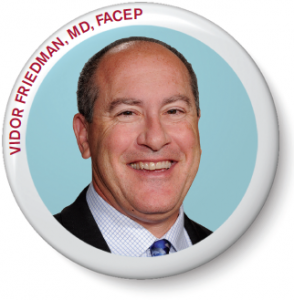 Current Professional Positions: Florida Emergency Physicians, Maitland
Current Professional Positions: Florida Emergency Physicians, Maitland
Internships and Residency: emergency medicine residency, Michigan State University, East Lansing
Medical Degree: MD, University of Cincinnati College of Medicine (1986)
![]()
The Board is made up of a diverse group of individuals, each with a unique set of strengths. My experience in community practice, medical staff leadership, legislative advocacy, and clinical teaching allows me to see issues from many perspectives. Having been an owner in two different emergency medicine practices has given me a great deal of experience in consensus building among strong personalities, a useful skill on any board! As chief of staff at my hospital, I worked hard to improve collaboration among a diverse, and divided, medical staff. I chaired the Federal Governmental Affairs Committee from 2009 to 2011 while the Patient Protection and Affordable Care Act was being hotly debated in Congress and among our membership! I then went on to help create the Emergency Medicine Action Fund to augment ACEP’s capacity in the regulatory lobbying arena.
As chair of the Emergency Medicine Foundation, I have pushed to increase our corporate partnerships and expanded our portfolio to include health policy research.
I understand that organizations, like people, must evolve and that the status quo should be questioned regularly to make sure it is still accomplishing its goals in the best possible way. It is also vital that an organization cultivate its new leaders. In Florida, I started FCEP’s Leadership Academy and have been very supportive of ACEP’s Leadership Development Committee.
To quote John Quincy Adams, “If your actions inspire others to dream more, learn more, do more, and become more, you are a leader.”
William Jaquis, MD, FACEP (Maryland)
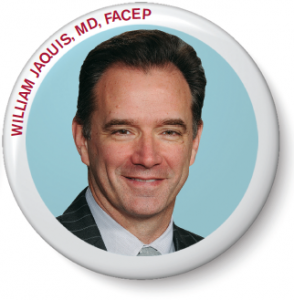 Current Professional Positions: chief, integrated services, LifeBridge Health (emergency medicine, radiology), Baltimore; chief, emergency services, LifeBridge Health; regional medical director, EmCare
Current Professional Positions: chief, integrated services, LifeBridge Health (emergency medicine, radiology), Baltimore; chief, emergency services, LifeBridge Health; regional medical director, EmCare
Internships and Residency: emergency medicine residency, Mt. Sinai Hospital, Cleveland
Medical Degree: MD, Medical College of Ohio (1989)
![]()
Having trained in Ohio and worked in Chicago for nine years and now in Baltimore for 14 years, I have a range of experience across many settings. As chief of a system that sees 150,000 patients a year, I have a broad range of familiarity of trauma centers, stroke centers, cardiac centers, and other aspects of emergency medicine in both teaching and community hospitals with the range of responsibility that a chief of service requires. As a clinician, I feel the joys and frustrations that drive future direction. My work at the chapter level has led me through the presidency, and through my advocacy work, I was appointed to other roles in the state. One of those roles is as a commissioner on the Health Resources Commission, which funds grants to health-related efforts through local health agencies. That role has broadened my perspective on the underserved communities and resources outside the hospital.
Nationally, I have worked with the College for two decades, serving on the Board the last three years. That progression of work has allowed me to serve in many capacities and to gain a good understanding of the resources and needs of the College. I feel well positioned to understand the needs and dynamics of the Board and to continue that work.
The leadership I provide at the Board level relates to two specific areas. The first is the ability to listen. Our membership contains a wide variety of skills from a diverse background. The intelligence, drive, and knowledge of those members never cease to amaze me. As I have approached my roles related to the many section, committees, and task forces I have joined, I am better able to learn from our members. My role is to advocate for them and further the great work they are doing. The second skill is that of direction. My leadership experience allows me to give guidance to our members and the Board on issues not moving forward. By listening and creating connections, I am able to provide practical solutions to get to a better outcome.
Finally, I believe through my experience and continuous drive to learn more about leadership, advocacy, and policy, I am able to provide strategic direction. It is important to not only see the next step but the future beyond and to find a course that will allow us to thrive in the long term.
Christopher S. Kang, MD, FACEP, FAWM (Washington)
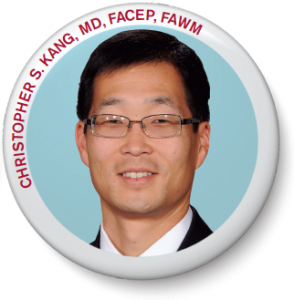 Current Professional Positions: attending physician, emergency medicine, Madigan Army Medical Center, Tacoma, Washington; institutional review board; staff physician, Olympia Emergency Physicians, LLC, Providence St. Peter Hospital, Olympia, Washington
Current Professional Positions: attending physician, emergency medicine, Madigan Army Medical Center, Tacoma, Washington; institutional review board; staff physician, Olympia Emergency Physicians, LLC, Providence St. Peter Hospital, Olympia, Washington
Internships and Residency: emergency medicine, Northwestern University, Chicago
Medical Degree: MD, Northwestern University (1996)
![]()
The next decade will mark a dynamic and historic time of opportunity for our College as we transition from fighting for acceptance by the members of the house of medicine to now being increasingly recognized as one of their leaders. As the practice, delivery, and remuneration of health care become more complex and determinative, it is vital that the College has visionary leaders. My background, skills, and knowledge would add diversity to the Board of Directors to continue advancing our profession and patient care.
While living in several countries, I learned to appreciate different cultures, values, and concepts. During my service in the United States Army, I observed and practiced medicine in multiple settings around the world, from austere environments and the back of ground and air ambulances to rural facilities and modern medical centers. I was also the medical project director for an ACEP grant that visited and evaluated the disaster preparedness of dozens of hospitals across the country. With this background, I can represent our colleagues with diverse experiences, practice settings, and priorities.
As a military officer, I became proficient with strategic planning and management—analyzing the context of a situation, setting common objectives, identifying resources, foreseeing contingencies, and adjusting plans in response to a changing environment. As research director, I objectively assess study proposals, review current literature, and critically evaluate data. As a result of these skills, I have learned to rapidly interpret and effectively employ those observations and results.
I work at a federally operated medical center and for a democratic group in a community hospital. Both jobs provide me firsthand experience working in contrastive employment models. They also afford me insight into the opportunities and challenges resulting from the implementation of the Affordable Care Act. As President, I led the Washington Chapter as it transitioned from a small to medium chapter and emerged as a leading College resource for several critical initiatives, including championing patient access to care, safeguarding network adequacy and fair payment, repudiating psychiatric boarding, curtailing opioid-related deaths, and advocating for user-oriented clinical health information systems. These experiences make me uniquely qualified to help chapters with their state challenges and ACEP’s efforts to coordinate national leadership around these issues.
Mark Rosenberg, DO, MBA, FACEP (New Jersey)
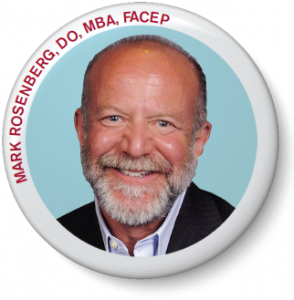 Current Professional Positions: chairman, emergency medicine, chief, geriatric emergency medicine, chief, palliative medicine, and chief, population health, St. Joseph’s Healthcare System, Paterson, New Jersey
Current Professional Positions: chairman, emergency medicine, chief, geriatric emergency medicine, chief, palliative medicine, and chief, population health, St. Joseph’s Healthcare System, Paterson, New Jersey
Internships and Residency: internship and nonaccredited residency, emergency medicine, Metropolitan Hospital, Philadelphia
Medical Degree: DO, Philadelphia College of Osteopathic Medicine (1978)
![]()
My professional career spans 35-plus years of experience as an emergency physician, including bedside ED physician, administrator, advocate, educator, and business owner. My unique abilities can be divided into three specific areas: leadership, advocacy, and innovation.
- My leadership skills have been demonstrated throughout my career, most recently as a successful chairman of emergency medicine at St. Joseph’s Healthcare System in Paterson, New Jersey. This is an academic, urban ED in which I oversee care to more than 165,000 patients annually.
- As current President of New Jersey ACEP, I lead the chapter’s advocacy efforts, focusing on out-of-network billing (fair compensation for emergency care) and opioid legislation. I also serve on the New Jersey governor’s Advisory Committee on Trauma and the New Jersey Legislative Task Force to address psychiatric overcrowding.
- As an innovator, I have developed one of the nation’s first geriatric emergency departments as well as an emergency department–based palliative medicine program and remain as chief of both programs.
Additionally, I have learned that collaboration is vital to success in this health care environment, inviting diverse stakeholders to collaborate and design programs, policies, and procedures to improve care. An example of this would be as chair of ACEP’s Geriatric Section (2011–2012). With the ACEP President’s approval, I worked with members of ACEP, American Geriatrics Society, Society for Academic Emergency Medicine, and Emergency Nurses Association to identify the essential components of a geriatric ED. This was quite an accomplishment due to the varied interests of the individual associations. However, through collaboration over a two-year period, we developed the “Geriatric Emergency Department Guidelines,” which have been published in each organization’s professional journal.
Similar to the current ACEP Board members, in my everyday practice of emergency medicine, I support the mission and values of the College. My unique abilities not only complement the Board but also expand its capabilities in terms of leadership, advocacy, and innovation.
Bradley J. Uren, MD, FACEP (Michigan)
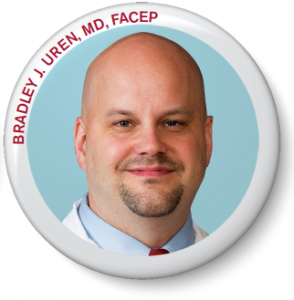 Current Professional Positions: clinical assistant professor, University of Michigan Medical School, Ann Arbor
Current Professional Positions: clinical assistant professor, University of Michigan Medical School, Ann Arbor
Internships and Residency: internship and residency, emergency medicine, University of Michigan Medical School, Ann Arbor
Medical Degree: MD, University of Michigan Medical School (2002)
![]()
I can bring the perspective of a young physician and diversity of experiences to the ACEP Board.
I was born and raised in rural Michigan, where the ED was a five-bed facility in a hospital with 60 inpatient beds. It was there that I first shadowed physicians in a professional setting as I explored a medical career. Seeing the role of the ED in a small community, as the first critical intervention, led directly to my choice of specialty. The emergency physician is always there, 24-7, in those communities when urgent and emergent needs arise. They are the embodiment of the most highly skilled acute care physician.
Those years were formative, and throughout my time in Michigan College of Emergency Physicians (MCEP) leadership, I used my hometown as a touchstone and point of comparison when considering the impact of changes in legislation, funding models, and workforce issues. Increasingly, the ED is the indispensable component of the health care system in communities and must be preserved and considered in any changes in practice.
While in residency, in 2003, I joined ACEP’s State Legislative/Regulatory Committee, serving continuously and chairing for the last three years. I also chaired MCEP’s legislative committee and lead Michigan’s 911 Network. I have had innumerable interactions with federal and state policy makers, both legislative and regulatory, and testified before our state legislature. In addition to working on a state Medicaid workgroup for emergency medicine, I currently work with Blue Cross Blue Shield of Michigan on an emergency physician–led quality initiative.
I also believe that emergency physicians have a unique body of knowledge they should share with the public. I have given numerous media interviews about EM-related issues (over 14 in 2015). I have penned letters to the editor and op-eds on issues related to emergency medicine and public health in Michigan. I believe that raising our specialty’s visibility will benefit our members, our specialty, and, ultimately, our patients.
In summary, I believe I bring the viewpoint of a young physician tempered by the experience of both ACEP and chapter leadership. I offer the balanced perspective of a university-based academic hospital employee with the heart of a small-town physician. My experience in academic settings is matched by dedication to EDs in places like my hometown. I believe that this duality and diversity of experience, as well as my ability to consider the opposing viewpoint, make me an ideal candidate for the ACEP Board of Directors.
James M. Williams, DO, MS, FACEP (Texas)
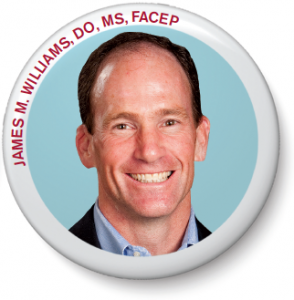 Current Professional Positions: attending emergency medicine physician, Covenant Medical Center, Lubbock, Texas; clinical assistant professor, Texas Tech University Health Sciences School of Medicine, Lubbock; physician quality review board, committee member, Covenant Medical Center, Lubbock; attending emergency medicine physician, Texas Health Harris Methodist Hospital Southlake, Dallas; advisor, clinical and player development, US Lacrosse
Current Professional Positions: attending emergency medicine physician, Covenant Medical Center, Lubbock, Texas; clinical assistant professor, Texas Tech University Health Sciences School of Medicine, Lubbock; physician quality review board, committee member, Covenant Medical Center, Lubbock; attending emergency medicine physician, Texas Health Harris Methodist Hospital Southlake, Dallas; advisor, clinical and player development, US Lacrosse
Internships and Residency: surgery internship, general surgery, Brooke Army Medical Center, Fort Sam Houston, Texas; residency, Brooke Army Medical Center
Medical Degree: DO, Philadelphia College of Osteopathic Medicine (1991)
![]()
I am uniquely qualified to serve and complement the Board with my proven leadership, integrity, and commitment.
Starting with more than nine years of military service and continuing nonstop since then, I have successfully served my fellow doctors, patients, and communities in numerous leadership positions. My military experience included tours in Germany and Bosnia, where I served deployed troops and played a pivotal role in village outreach. A few of my leadership positions over the past couple of decades include serving as army commander; Texas College of Emergency Physicians President; co-chair of a five-hospital quality review committee; clinical professor; hospital chief of staff; and board member of my family’s church, children’s school, and local businesses.
Like you, I am a practicing emergency physician who serves our patients in the pit, days, nights, weekends, and holidays. This provides us credibility when speaking with legislators and stakeholders, and that’s one of the many reasons I am very active with both the state and federal legislatures, advocating on behalf of our doctors and patients. Additionally, I have served as a medical and health consultant to local and national media, communicating our service message to positively promote our profession.
I recently fought on behalf of emergency physicians in Texas to maintain our tort reform. I coordinated efforts of the Texas Medical Association, TMLT (insurance carrier for most Texas physicians), TAPA (a patient and physician access advocacy group), the American College of Emergency Physicians, and local hospitals to file amicus briefs on their behalf against plaintiff attorneys in New Mexico who argued care given in Texas is subject to New Mexico tort laws. This is a critical case in supporting patient access to care and has implications nationally.
It is also important to note that I will bring geographic diversity to the Board. While most current Board members and other candidates live on the east and west coasts, I am in Texas and can provide a voice for our central and southern states.
I want to be our sure our needs and concerns are shared and heard. I will be your voice on the Board. Thank you for your consideration, and I ask for your vote so I can work with our current and new members to be an advocate for you, our patients, and our specialty.





No Responses to “2015 ACEP Elections Preview: Meet the Board of Directors Candidates”